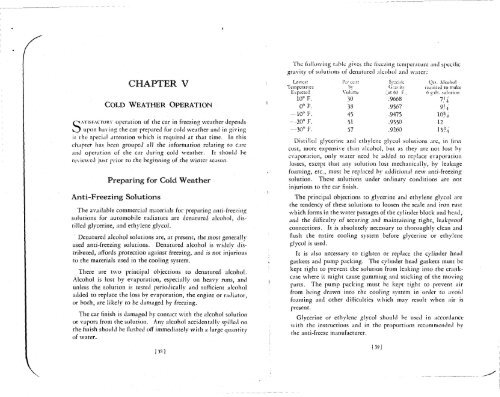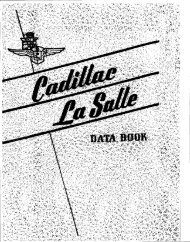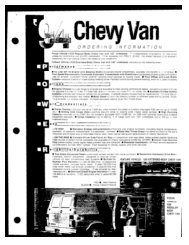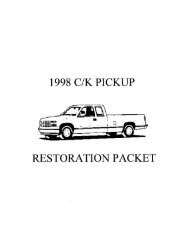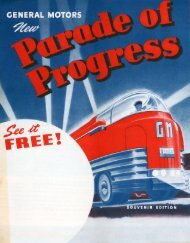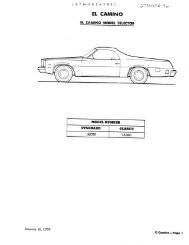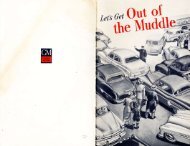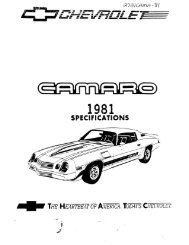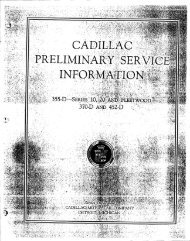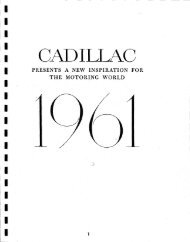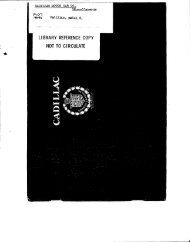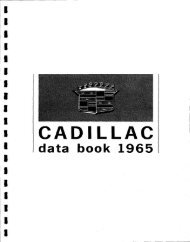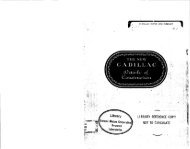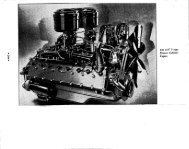1930 Cadillac Brochure Front Cover - GM Heritage Center
1930 Cadillac Brochure Front Cover - GM Heritage Center
1930 Cadillac Brochure Front Cover - GM Heritage Center
You also want an ePaper? Increase the reach of your titles
YUMPU automatically turns print PDFs into web optimized ePapers that Google loves.
CHAPTER V<br />
COLD WEATHER OPERATION<br />
SATISFACTORY operation of the car in freezing weather depends<br />
upon having the car prepared for cold weather and in giving<br />
it the special attention which is required at that time. In this<br />
chapter has been grouped aJJ the information relating to care<br />
and operation of the car during cold weather. It should be<br />
reviewed just prior to the beginning of the winter season.<br />
Preparing for Cold Weather<br />
Anti-Freezing Solutions<br />
The available commercial materials for preparing anti-freezing<br />
solutions for automobile radiators are denatured alcohol, distilled<br />
glycerine, and ethylene glycol.<br />
Denatured alcohol solutions are, at present, the most generally<br />
used anti-freezing solutions. Denatured alcohol is widely distributed,<br />
affords protection againsr freezing, and is not injurious<br />
to the materials used in the cooling system.<br />
There are two principal objections to denatured alcohol.<br />
Alcohol is lost by evaporation, especially on heavy runs, and<br />
unless the solution is tested periodically and sufficient alcohol<br />
added to replace the loss by evaporation, the engine or radiator,<br />
or both, are likely to be damaged by freezing.<br />
The car finish is damaged by contact with the alcohol solution<br />
or vapors from the solution. Any alcohol accidentally spilled on<br />
the finish should be flushed olF immediately with a large quantity<br />
of water.<br />
[3S1<br />
The following tabic gives the freezing temperature and specific<br />
gravity of solutions of denatured alcohol and water:<br />
Lowest<br />
Temperature<br />
Expected<br />
10° F.<br />
0°F.<br />
-10° F.<br />
—20° F.<br />
--30° F.<br />
Per cent<br />
hy<br />
Volume<br />
30<br />
38<br />
45<br />
51<br />
57<br />
Specific<br />
Gra\ itv<br />
Cat 60 F..<br />
.9668<br />
.9567<br />
.9475<br />
.9350<br />
.9260<br />
Qt ;. Alcohol<br />
required to make<br />
6gi Is. solution<br />
Di<br />
9U<br />
10? ,|<br />
12<br />
I3?.t<br />
Distilled glycerine and ethylene glycol solutions are, in lirst<br />
cost, more expensive than alcohol, but as they are not lost by<br />
evaporation, only water need be added to replace evaporation<br />
losses, except that any solution lost mechanically, by leakage<br />
foaming, etc., must be replaced by additional new anti-freezing<br />
solution. These solutions under ordinary conditions are not<br />
injurious to the car finish.<br />
The principal objections to glycerine and ethylene glycol are<br />
the tendency of these solutions to loosen the scale and iron rust<br />
which forms in the water passages of the cylinder block and head,<br />
and the difficulty of securing and maintaining tight, leakproof<br />
connections. It is absolutely necessary to thoroughly clean and<br />
flush the entire cooling system before glycerine or ethylene<br />
glycol is used.<br />
It is also necessary to tighten or replace the cylinder head<br />
gaskets and pump packing. The cylinder head gaskets must be<br />
kept tight to prevent the solution from leaking into the crankcase<br />
where it might cause gumming and sticking of the moving<br />
parts. The pump packing must be kept tight to prevent air<br />
from being drawn into the cooling system in order to avoid<br />
foaming and other difficulties which may result when air is<br />
present.<br />
Glycerine or ethylene glycol should be used in accordance<br />
with the instructions and in the proportions recommended by<br />
the anti-frceze manufacturer.<br />
139]


